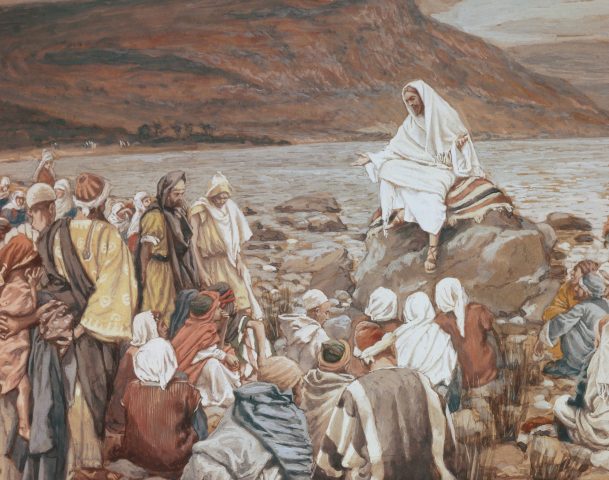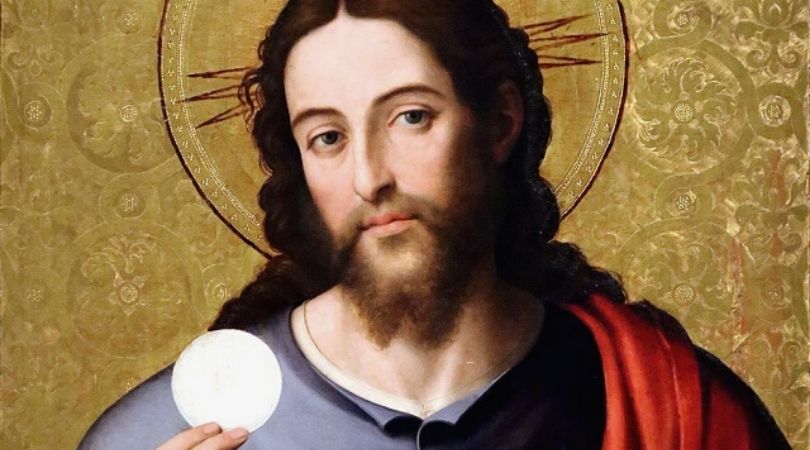GOSPEL READING: John 7:1-2, 10, 25-30
1 After this Jesus went about in Galilee; he would not go about in Judea, because the Jews sought to kill him. 2 Now the Jews’ feast of Tabernacles was at hand. 10 But after his brothers had gone up to the feast, then he also went up, not publicly but in private. 25 Some of the people of Jerusalem therefore said, “Is not this the man whom they seek to kill? 26 And here he is, speaking openly, and they say nothing to him! Can it be that the authorities really know that this is the Christ? 27 Yet we know where this man comes from; and when the Christ appears, no one will know where he comes from.” 28 So Jesus proclaimed, as he taught in the temple, “You know me, and you know where I come from? But I have not come of my own accord; he who sent me is true, and him you do not know. 29 I know him, for I come from him, and he sent me.” 30 So they sought to arrest him; but no one laid hands on him, because his hour had not yet come.
SCRIPTURE READING: Wisdom 2:1,12-22 (Deutero-canonical book)
1 For they reasoned unsoundly, saying to themselves, “Short and sorrowful is our life, and there is no remedy when a man comes to his end, and no one has been known to return from Hades… 12 “Let us lie in wait for the righteous man, because he is inconvenient to us and opposes our actions; he reproaches us for sins against the law, and accuses us of sins against our training. 13 He professes to have knowledge of God, and calls himself a child of the Lord. 14 He became to us a reproof of our thoughts;15 the very sight of him is a burden to us, because his manner of life is unlike that of others, and his ways are strange. 16 We are considered by him as something base, and he avoids our ways as unclean; he calls the last end of the righteous happy, and boasts that God is his father.
17 Let us see if his words are true, and let us test what will happen at the end of his life; 18 for if the righteous man is God’s son, he will help him, and will deliver him from the hand of his adversaries. 19 Let us test him with insult and torture, that we may find out how gentle he is, and make trial of his forbearance. 20 Let us condemn him to a shameful death, for, according to what he says, he will be protected.” 21 Thus they reasoned, but they were led astray, for their wickedness blinded them,22 and they did not know the secret purposes of God, nor hope for the wages of holiness, nor discern the prize for blameless souls
Meditation: What can hold us back from doing the will of God? Fear, especially the fear of death and the fear of losing the approval of others, can easily rob us of courage and the will to do what we know is right. Jesus met opposition and the threat of death with grace and determination to accomplish his Father’s will. Jesus knew that his mission, his purpose in life, would entail sacrifice and suffering and culminate with death on the cross. But that would not be the end. His “hour” would crush defeat with victory over sin and Satan, condemnation with pardon and freedom, and death with glory and everlasting life.
Jesus offered up his life for us to restore us to friendship with God
He willingly suffered for our sake and embraced the cross to redeem us from sin and to restore us to new life and friendship with God our Father.
Saint Augustine of Hippo (354-430 AD) wrote:
“Our Lord had the power to lay down his life and to take it up again. But we cannot choose how long we shall live, and death comes to us even against our will. Christ, by dying, has already overcome death. Our freedom from death comes only through his death. To save us Christ had no need of us. Yet without him we can do nothing. He gave himself to us as the vine to the branches; apart from him we cannot live.”
No one can be indifferent with Jesus for very long. What he said and did – his miraculous signs and wonders – he did in the name of God. Jesus not only claimed to be the Messiah, God’s Anointed One – he claimed to be in a unique relationship of sonship with God the Father and to know him as no one else did. To the Jews this was utter blasphemy. The religious authorities did all they could to put a stop to Jesus because they could not accept his claims and the demands he made.
Jesus alone can set us free from the power of sinful pride, rebellion, and fear
We cannot be indifferent to the claims which Jesus makes on us. We are either for him or against him. There is no middle ground. We can try to mold the Lord Jesus to our own ideas and way of thinking or we can allow his word of truth to free us from our own sinful blindness, stubborn pride, and ignorance. Do you accept all that Jesus has taught and done for you with faith and reverence or with disbelief and contempt? The consequences are enormous, both in this life and in eternity.
Eternal God, who are the light of the minds that know you, the joy of the hearts that love you, and the strength of the wills that serve you; grant us so to know you, that we may truly love you, and so to love you that we may fully serve you, whom to serve is perfect freedom, in Jesus Christ our Lord.
Psalm 34:17-22
17 When the righteous cry for help, the LORD hears, and delivers them out of all their troubles.
18 The LORD is near to the brokenhearted, and saves the crushed in spirit.
19 Many are the afflictions of the righteous; but the LORD delivers him out of them all.
20 He keeps all his bones; not one of them is broken.
21 Evil shall slay the wicked; and those who hate the righteous will be condemned.
22 The LORD redeems the life of his servants; none of those who take refuge in him will be condemned.
Daily Quote from the Early Church Fathers: Christ our physician, by Augustine of Hippo, 354-430 A.D.
“As Christians, our task is to make daily progress toward God. Our pilgrimage on earth is a school in which God is the only teacher, and it demands good students, not ones who play truant. In this school we learn something every day. We learn something from commandments, something from examples, and something from sacraments. These things are remedies for our wounds and materials for study.” (excerpt from Sermon 218c,1)







